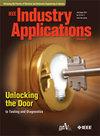Temperature Prediction for Electric Vehicles Using Machine Learning Algorithms
IF 4.2
2区 工程技术
Q2 ENGINEERING, ELECTRICAL & ELECTRONIC
引用次数: 0
Abstract
The development of precise, efficient, and cost-effective temperature prediction algorithms to maintain the ambient charging and operational environment of electric vehicles (EVs) has gained significance in recent times. Machine learning algorithms are widely used for prediction and decision-making processes due to the growing presence of optimized statistical models based on training datasets, that are far superior to conventional computational statistical methods. In this work, a temperature dataset has been generated in real-time from an IoT and temperature sensor-based hardware, clipped-on the casing of a vehicle, pre-possessed and fitted into optimized models so that future values of temperature can be accurately predicted using different supervised regression machine learning algorithms. The predicted temperatures have been compared with the actual recorded temperatures and a statistical error analysis has been done to compare the results based on the Mean Absolute Error (MAE), Mean Squared Error (MSE), Root Mean Squared Error (RMSE), R-Square (R 2 ) and adjusted R 2 Score. The advantage of this methodology is that it is independent of system parameters, and that any future values of critically high temperature may be predicted before they occur, so that drivers can be alerted and take corrective measures before actual damage takes place. This methodology may be applied to prevent incidents of fire in EV batteries, energy wastage due to high temperatures during charging or normal running, and to enhance passenger comfort.利用机器学习算法预测电动汽车的温度
近来,开发精确、高效、经济实惠的温度预测算法以维护电动汽车(EV)的充电和运行环境变得越来越重要。机器学习算法被广泛应用于预测和决策过程,这是因为基于训练数据集的优化统计模型越来越多,远远优于传统的计算统计方法。在这项工作中,温度数据集是由基于物联网和温度传感器的硬件实时生成的,这些硬件被夹在车辆外壳上,并被预置和拟合到优化模型中,以便使用不同的监督回归机器学习算法来准确预测未来的温度值。预测的温度与实际记录的温度进行了比较,并根据平均绝对误差 (MAE)、平均平方误差 (MSE)、均方根误差 (RMSE)、R 平方 (R2) 和调整后的 R2 分数进行了统计误差分析。这种方法的优势在于它不受系统参数的影响,可以在未来出现临界高温值之前对其进行预测,从而在实际损害发生之前提醒驾驶员并采取纠正措施。这种方法可用于防止电动汽车电池起火、充电或正常运行时因高温造成能源浪费,以及提高乘客舒适度。
本文章由计算机程序翻译,如有差异,请以英文原文为准。
求助全文
约1分钟内获得全文
求助全文
来源期刊

IEEE Transactions on Industry Applications
工程技术-工程:电子与电气
CiteScore
9.90
自引率
9.10%
发文量
747
审稿时长
3.3 months
期刊介绍:
The scope of the IEEE Transactions on Industry Applications includes all scope items of the IEEE Industry Applications Society, that is, the advancement of the theory and practice of electrical and electronic engineering in the development, design, manufacture, and application of electrical systems, apparatus, devices, and controls to the processes and equipment of industry and commerce; the promotion of safe, reliable, and economic installations; industry leadership in energy conservation and environmental, health, and safety issues; the creation of voluntary engineering standards and recommended practices; and the professional development of its membership.
 求助内容:
求助内容: 应助结果提醒方式:
应助结果提醒方式:


